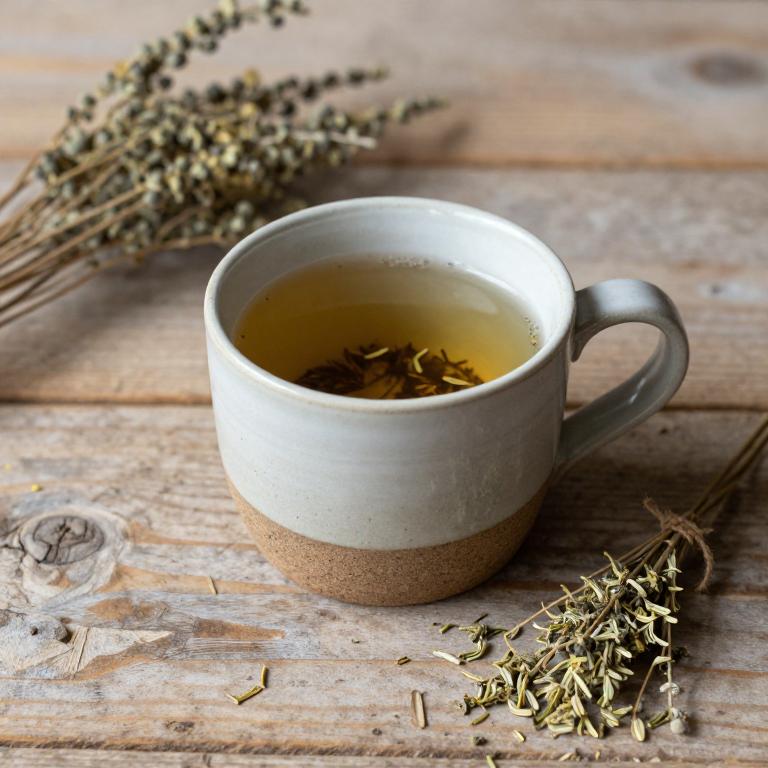10 Best Herbal Teas For Gum Infection

Herbal teas can be a natural and effective remedy for gum infections due to their anti-inflammatory and antimicrobial properties.
Certain herbs like chamomile, green tea, and peppermint are known to reduce inflammation and soothe gum irritation. To use herbal tea for gum health, it is recommended to steep the leaves in hot water and let it cool before rinsing the mouth. Regular use of these teas can help prevent bacterial growth and promote healing of infected gums.
However, it is important to consult with a dentist for persistent or severe gum infections, as herbal treatments should complement, not replace, professional care.
Table of Contents
- 1. Salvia (Salvia officinalis)
- 2. Rosemary (Rosmarinus officinalis)
- 3. Echinacea (Echinacea purpurea)
- 4. Oregano (Origanum vulgare)
- 5. Thyme (Thymus vulgaris)
- 6. St. john's wort (Hypericum perforatum)
- 7. Stinging nettle (Urtica dioica)
- 8. Lemon balm (Melissa officinalis)
- 9. Aloe vera (Aloe barbadensis)
- 10. Ceylon cinnamon (Cinnamomum zeylanicum)
1. Salvia (Salvia officinalis)

Salvia officinalis, commonly known as sage, has been traditionally used in herbal teas to support oral health and alleviate symptoms of gum infections.
The tea contains antibacterial and anti-inflammatory compounds, such as thujone and rosmarinic acid, which help reduce harmful bacteria in the mouth. Regular consumption of sage tea may help decrease gum inflammation, redness, and bleeding, promoting overall periodontal health. It is often recommended as a natural remedy to complement conventional dental care routines.
However, it is important to consult with a healthcare professional before using sage tea, especially for prolonged periods or in combination with other medications.
2. Rosemary (Rosmarinus officinalis)

Rosmarinus officinalis, commonly known as rosemary, is a versatile herb that has been traditionally used for its antimicrobial and anti-inflammatory properties.
When brewed into a herbal tea, rosemary can help reduce gum inflammation and combat bacterial growth, making it a beneficial natural remedy for gum infections. The essential oils in rosemary, such as cineole and rosmarinic acid, contribute to its ability to soothe irritated gums and promote healing. Regular consumption of rosemary tea may support overall oral health by freshening breath and reducing plaque buildup.
However, it is advisable to consult a healthcare professional before using it as a treatment for persistent gum infections.
3. Echinacea (Echinacea purpurea)

Echinacea purpurea, commonly known as purple coneflower, is a popular herbal remedy often used in teas to support immune health.
While it is not a cure for gum infections, some studies suggest that echinacea may help reduce inflammation and promote healing in the oral cavity. The tea is believed to contain compounds that can inhibit the growth of bacteria, which are often responsible for gum disease. When consumed regularly, echinacea tea may aid in preventing the progression of gingivitis and supporting overall oral hygiene.
However, it is important to consult with a dentist or healthcare provider for proper treatment of severe gum infections.
4. Oregano (Origanum vulgare)

Oregano vulgaris, commonly known as origanum vulgare, is a popular herb used in herbal teas for its potent antimicrobial and anti-inflammatory properties.
This herb contains compounds like carvacrol and thymol, which have been shown to inhibit the growth of bacteria that contribute to gum infections. When brewed into a tea, origanum vulgare can help reduce inflammation, soothe sore gums, and promote overall oral health. It is often recommended as a natural remedy to support healing in cases of mild gum disease or gingivitis.
However, it is advisable to consult with a healthcare professional before using it as a treatment, especially for more severe or persistent gum infections.
5. Thyme (Thymus vulgaris)

Thymus vulgaris, commonly known as thyme, is a popular herb used in herbal teas to support oral health and combat gum infections.
The essential oils in thyme, particularly thymol, possess strong antimicrobial properties that can help reduce the bacteria responsible for gum disease. When brewed into a tea, thyme can soothe inflamed gums and promote healing due to its anti-inflammatory effects. Regular consumption of thyme herbal tea may help prevent plaque buildup and reduce the risk of gingivitis.
However, it is advisable to consult a healthcare professional before using thyme tea as a treatment for persistent gum infections.
6. St. john's wort (Hypericum perforatum)

Hypericum perforatum, commonly known as St. John's Wort, is a herbal plant that has been traditionally used for its anti-inflammatory and antimicrobial properties.
While it is often used for mood disorders, some studies suggest that its compounds may help reduce inflammation and fight bacterial infections, making it a potential natural remedy for gum infections. When brewed as a tea, hypericum perforatum can be applied topically or consumed orally to support oral health and reduce symptoms of gingivitis. However, it is important to consult a healthcare professional before using it, as it may interact with certain medications.
Overall, hypericum perforatum herbal tea may offer some supportive benefits for gum infections, though it should not replace conventional dental treatments.
7. Stinging nettle (Urtica dioica)

Urtica dioica, commonly known as stinging nettle, has been traditionally used in herbal medicine for its anti-inflammatory and antimicrobial properties, making it a potential natural remedy for gum infections.
When prepared as a herbal tea, stinging nettle can help reduce inflammation and soothe irritated gums, offering relief from symptoms such as redness, swelling, and bleeding. The tea is typically made by steeping dried nettle leaves in hot water for several minutes, allowing the beneficial compounds like flavonoids and minerals to infuse into the liquid. Regular consumption of urtica dioica tea may support overall oral health by promoting healing and reducing bacterial buildup in the mouth.
However, it is advisable to consult with a healthcare professional before using it as a treatment for gum infections, especially if you have existing health conditions or are taking medications.
8. Lemon balm (Melissa officinalis)

Melissa officinalis, also known as lemon balm, is a versatile herb that has been traditionally used for its calming and healing properties.
When brewed into a herbal tea, it can help reduce inflammation and soothe oral discomfort associated with gum infections. The anti-inflammatory and antimicrobial compounds in lemon balm may inhibit the growth of bacteria that contribute to periodontal disease. Regular consumption of melissa officinalis tea may support overall gum health and promote faster healing of infected tissues.
While it can be a complementary therapy, it should not replace professional dental care for severe gum infections.
9. Aloe vera (Aloe barbadensis)

Aloe barbadensis, commonly known as aloe vera, has been traditionally used for its soothing and healing properties, making it a popular ingredient in herbal teas aimed at addressing gum infections.
These teas often combine aloe vera with other anti-inflammatory and antimicrobial herbs like chamomile, green tea, or licorice root to enhance their therapeutic effects. The gel-like substance in aloe vera helps reduce inflammation and promotes healing in the gums, while the tea's gentle nature makes it suitable for daily use without causing irritation. Regular consumption of aloe barbadensis herbal tea may help alleviate symptoms such as swelling, redness, and bleeding gums associated with gingivitis.
However, it is advisable to consult a healthcare professional before using these teas as a primary treatment for persistent or severe gum infections.
10. Ceylon cinnamon (Cinnamomum zeylanicum)

Cinnamomum zeylanicum, commonly known as cinnamon, is often used in herbal teas to help alleviate symptoms of gum infections due to its natural antimicrobial and anti-inflammatory properties.
The essential oils found in cinnamon, such as cinnamaldehyde, have been shown to inhibit the growth of bacteria that contribute to gingivitis and periodontal disease. When brewed into a warm herbal tea, cinnamon can soothe inflamed gums and reduce bad breath associated with oral infections. Regular consumption of cinnamon tea may support overall oral health by promoting a balanced microbial environment in the mouth.
However, it is advisable to consult a healthcare professional before using cinnamon tea as a treatment for persistent gum infections.